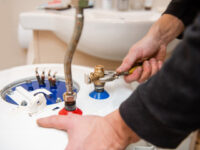Water Heater Repair: Signs That Your Water Heater Tank Is Leaking
Whether you are a do-it-yourselfer or a service professional like Plumbing Northridge it is always best to place safety first. This is especially true when working on a water heater.
Turn off the circuit breaker that supplies power to the water heater. Remove the access panel, plastic safety guard, and insulation from each heating element.
The most common cause of discolored water is naturally occurring minerals in your drinking water. These minerals are heavier than water and tend to settle in your water mains during periods of low usage. When water use increases again, the minerals are stirred up and flow out of your faucets. This process is typically controlled by your city’s water utility to keep water discoloration to a minimum.
Your internal household plumbing can also contribute to discolored water, especially if it contains galvanized pipe. The zinc coating on the inside of galvanized pipes can wear thin over time, causing rust and discoloration when water comes into contact with it. If you have galvanized pipe in your house, it’s a good idea to replace it before rust or other contaminants build up.
Discolored hot water is sometimes caused by iron-reducing bacteria that actually eat the iron in your water supply. These bacteria are usually found in smaller or older buildings that rely on a well for their water rather than a larger municipal water system.
Regardless of the source, temporary discolored water is rarely harmful to drink and can be cleared up by flushing your water heater and household plumbing. It’s worth comparing the color of your cold and hot water to determine whether the problem is isolated to your water heater or other parts of your home’s plumbing.
If only your hot water is affected, then the issue is likely with the tank itself. Older models of water heaters may contain layers of mineral sediment at the bottom that can discolor your water. Flushing your water heater regularly can remove this sediment before it hardens and shortens the life expectancy of your appliance.
Unusual Smells
If you notice an unpleasant odor coming from your hot water, it could be a sign that the water heater tank is leaking. This smell is caused by hydrogen sulfide gas, which is created by sulfur-reducing bacteria in the water. This bacteria is present in well water and in city-maintained water systems, but it can also build up in water heater tanks that are not properly maintained or flushed. The odor is particularly noticeable when the water is hot, but it can be noticed when you run cold water as well.
If the odor is confined to your hot water, you may want to try sniffing the water while it is running. This will allow you to determine if the problem is isolated to your hot water tank or to your water supply as a whole. Typically, any taste or odor problems that are observed in both hot and cold water will be a result of issues with the city-maintained water supply. A rotten egg smell, however, is almost always an indication that the water heater is the source of the smell.
Aside from the obvious rotten egg smell, you might also notice an earthy or musty odor, river-like, grassy, or other natural descriptors. These are often caused by minerals and other naturally occurring substances that can contaminate your water. A professional will be able to determine the exact cause of your smell and recommend the best course of action.
In some cases, you might smell a burning odor. This smell is usually caused by insulation around the water heater that comes into contact with the burner. It is important that this insulation be replaced immediately to prevent any burns or melting of the wiring.
Another unusual odor that can indicate the need for water heater repair is one that smells like sewage. This smell is due to a high level of hydrogen sulfide, which can be found in sewage, septic tanks, and volcanic vents. This odor can also be produced in water heater tanks that have not been flushed for long periods of time or when the temperature and pressure relief valves are unable to open properly. In this case, it is important to call a plumber immediately to inspect the water heater and make the necessary repairs.
Tank Leaks
There are a few different things that can lead to water heater tank leaks. One possibility is that the dip tube has worn out, allowing cool water to mix in with the hot and drop down to the bottom of the tank, where it can be reheated. This is a fairly inexpensive part to replace, and it’s relatively easy for a plumber to do. Another possible problem is that the temperature-pressure relief valve has worn out and is leaking. Again, this is not expensive to fix, but it will be more costly than repairing a small leak in the drain valve or an internal element problem.
Leaks from the tank can be serious, as they can flood areas around your unit and cause damage to floors and sub-floors. In the worst-case scenario, they can also lead to mold and mildew problems. A tank leak should be repaired immediately, and a professional plumber can help you determine the best course of action.
If you have a gas water heater, an unusual smell or discoloration can indicate that there is a problem with the pilot light. If you suspect this is the case, turn off your gas supply and open windows to allow any excess gas to dissipate. Then, carefully attempt to reignite the pilot light. If you cannot get the pilot light to stay lit, it’s time to call a Carter professional plumber for a replacement or new installation.
An electric water heater with bad elements may start leaking as they wear out. This is an easy repair, but it’s still something that should be addressed immediately. Similarly, if your water heater is making a lot of noise, it’s time to have an electrician take a look at the wiring and determine if there are any problems.
As the water heater ages, sediment builds up inside the tank and decreases its efficiency. It’s also a common cause of rust and corrosion. A water heater flush is a good way to get rid of sediment and reduce the risk of these issues. It’s important to check the water heater flush schedule as recommended by your manufacturer.
Electrical Issues
If your water heater doesn’t produce hot water, the problem could be in the electrical wiring or power. This could also mean a thermostat issue or the pilot light for gas units. Depending on the type of unit, you may need a professional electrician to assist with your water heater repair.
If you have an electric water heater, the lack of hot water might indicate that the heating element has gone bad. The heating element is a coil inside the tank that heats up to produce hot water. It can wear out over time, and the problem is typically accelerated by mineral deposits that dissolve in your water and then harden onto the heating element over time. A professional can replace the heating element with one of identical wattage to avoid issues down the road.
The lack of hot water could also be caused by a faulty high-temperature limit switch or an overheating pilot flame. In these cases, you will need to have a professional address the gas control valve or pilot flame or replace the thermocouple on the pilot light.
A leaking water heater is another common and usually serious problem that requires a professional. Leaks can be caused by the rusting of the tank, overpressure, or even a broken drain valve.
In the event of a leak, you should immediately shut off the electricity to your water heater by switching it off at the house circuit breaker or fuse box. You will then need to flush the water lines and clean up any water that has spilled.
You will want to check the condition of your water heater’s insulation and access panels to ensure they are in good shape. It is also a good idea to check all wire connections on the water heater and make sure they are not worn or corroded. Finally, you should make sure there are no wires dangling or resting on the floor where they might be susceptible to tripping or being stepped on. This can cause a fire hazard or pose an electric shock risk and should be avoided.






